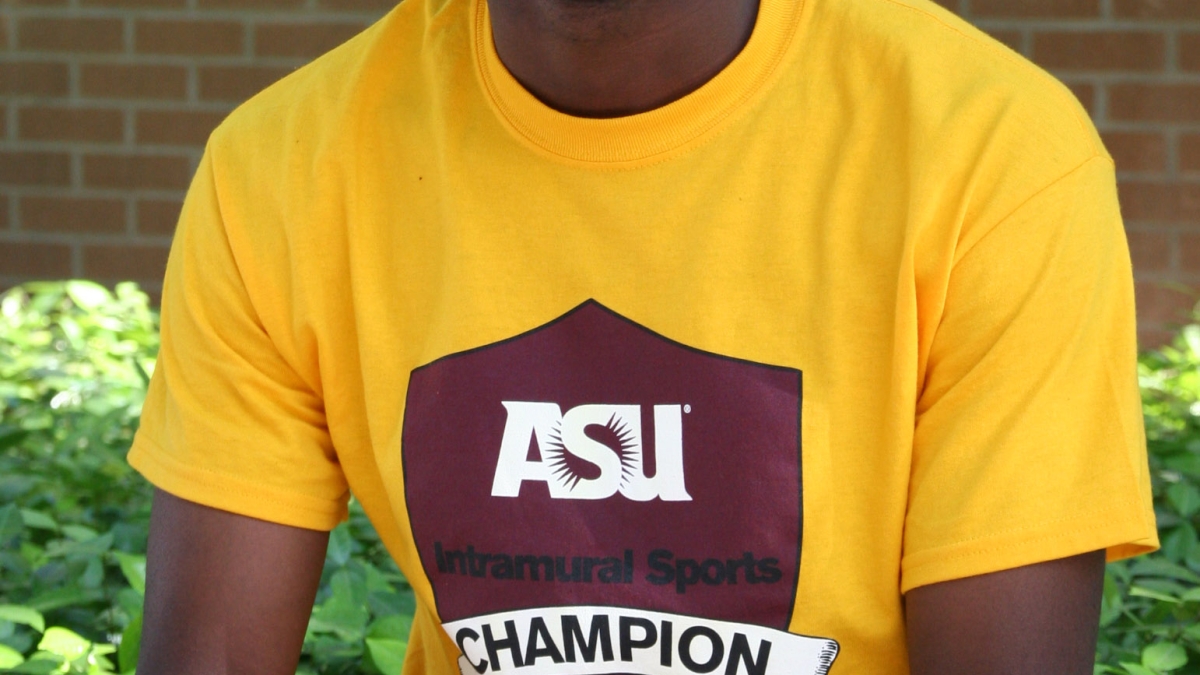Student ventures from Southeast Africa to pursue gender studies at ASU's West campus

Moving away to college is a big deal for any young person. But when you are leaving your family thousands of miles away across an ocean, it takes more than a usual dose of courage and confidence.
Ernest Chakwera recently wrapped up his freshman year as a women and gender studies major in ASU’s New College of Interdisciplinary Arts and Sciences, the core college on the West campus. Since he took his first trip to the airport and boarded a plane in his home country of Malawi last July 29, he has had experiences ranging from learning the importance of drinking plenty of water in a desert environment to meeting former President Bill Clinton.
Chakwera’s sojourn to the United States probably wouldn’t have happened if it weren’t for a set of circumstances beyond his control. He graduated from high school in 2010 at age 16, and as is typical for youth in Malawi, his plan was to spend the next year preparing for the University of Malawi’s entrance exam. But political issues led to the university’s closure, leaving him contemplating his next move.
“I was told about USAP, the United States Student Achievers Program, and I applied,” Chakwera said. USAP provides assistance to students demonstrating academic excellence, leadership potential and an ethos of giving back to the community. Chakwera displayed that ethos in his home community, working as a volunteer teaching basic skills in reading, writing and math to adults (most of whom were women).
Being accepted by USAP meant he received assistance preparing for the SAT exam and applying to universities in the United States. At first, ASU wasn’t on his wish list, but he later decided to apply to become a Sun Devil. He then found that ASU posed fewer bureaucratic hurdles than other universities.
“Other schools were telling me my application was incomplete, while I could complete my ASU application online,” Chakwera said.
Another piece of good fortune came his way when he successfully competed for a MasterCard Foundation scholarship to finance his education. His reaction to that news was simple: “I don’t believe this!”
Chakwera’s goal is to return to Malawi after graduation and work to advance women’s rights. “That is my passion,” he said. “I want women to have the same opportunities as men, whether it’s access to education or the chance to succeed in the business world.”
To succeed at impacting society, Chakwera knows that it’s important to be involved and make connections with the people around him. And he dove right in upon his arrival at the West campus, participating in Camp Solera for incoming freshmen and starting to make new friends.
He then took seriously the advice he received in his Freshman Experience class to get involved on campus and in the community. Chakwera has engaged in community service through Changemaker Central and Devils in Disguise, while also becoming involved with the Young Life organization on campus and with the Faithful City church in Tempe.
He has also experienced other aspects of American culture, including ASU football games in Tempe. Attending his first game left him more confused than anything, he admits.
Trying to understand football hasn’t been the only challenge involved with adjusting to a new country. A new climate, cultural differences in the way people dress and interact, adjusting to a new time zone while staying up late to talk to friends and family back in Malawi, and getting used to American food have all been part of Chakwera’s life over the past several months.
Duku Anokye has done her part to help him deal with his lack of enthusiasm for American food. The New College professor has traveled multiple times to another African country, Ghana, working on oral history projects.
“I first met Ernest a couple weeks after he arrived on campus,” Anokye said. “He was homesick, and Jenna Graham (a New College Student Success staff member) was good enough to put me in touch with him. I brought him home one weekend and gave him some good Ghanaian home cooking.”
Anokye and Graham, along with professor Sarah Stage and Chakwera’s roommate Dennis Ramos, were among those who helped Chakwera with his proposal to participate in the Clinton Global Initiative University, hosted by ASU in March at the Tempe campus. Chakwera describes it as an amazing experience. In addition to meeting President Clinton, he had the chance to meet other young people from around the U.S. who are determined to make positive changes in society. He says he learned from other people’s projects how to make his own (which focuses on empowering girls through education) more sustainable.
Chakwera is collaborating this summer with Anokye through New College’s NCUIRE program, which provides a stipend to students to work under faculty guidance on research projects.
In his NCUIRE project, Chakwera is working to review, transcribe, analyze and discuss 13 interviews of African Americans who have lived and worked in Arizona for over 20 years, contributing to the social and cultural welfare of Arizonans. The collection of interviews, produced by Anokye over the past 13 years, highlights African American citizens of Arizona and their contributions.
“This project will give Ernest insights into oral history methodology, as well as African American men and women’s lives in Arizona – skills that can be transferable to a variety of settings, including his native country,” Anokye said.
Like many freshmen, Chakwera is contemplating adding another major or switching majors. Whichever degree he ultimately earns, he expects to be ready to return home and continue the fight for women’s rights.
“Ernest is a truly remarkable young man,” Anokye said. “I have high hopes for what he can accomplish.”